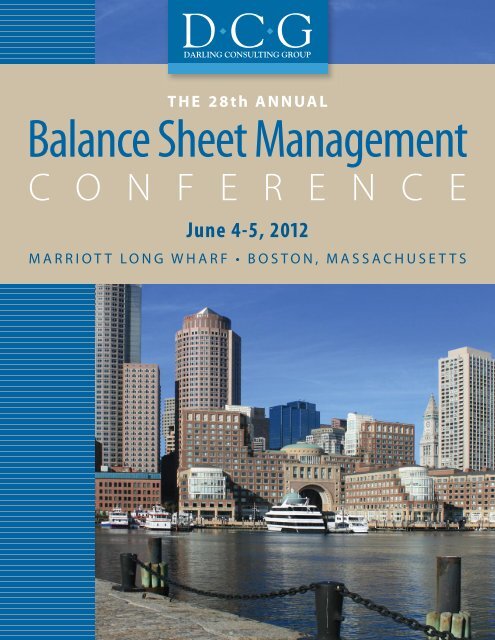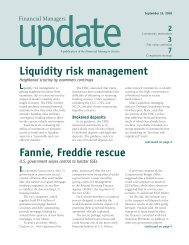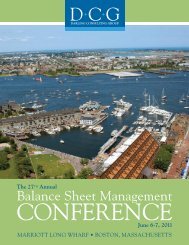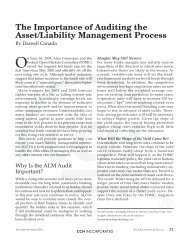conference - Darling Consulting Group
conference - Darling Consulting Group
conference - Darling Consulting Group
You also want an ePaper? Increase the reach of your titles
YUMPU automatically turns print PDFs into web optimized ePapers that Google loves.
THE 28th ANNUAL<br />
Balance Sheet Management<br />
C O N F E R E N C E<br />
June 4-5, 2012<br />
MARRIOTT LONG WHARF • BOSTON, MASSACHUSETTS
CONFERENCE SESSIONS<br />
Balance Sheet<br />
Accelerating Branch Network Profitability<br />
Lessons from high-performing banks and retailers<br />
Banks are challenged to drive incremental profitability from their<br />
branch networks in today’s low-rate environment. In this session<br />
Richard Pilla and Michael Purchia detail what smart bankers are<br />
doing to outperform the competition. These strategies work for<br />
urban, suburban and rural banks and include: assessing existing<br />
and new market trade areas to consolidate branch facilities and<br />
re-deploy capital, taking advantage of new technologies and<br />
banking patterns to re-configure branches and reduce staffing,<br />
systematically building C&I and small business loans using<br />
better information and tracking tools, and using the negotiating<br />
secrets of McDonald’s and Starbucks to cut costs. In this session<br />
you will walk away with specific to-dos that can make a difference<br />
for your bank in 2012.<br />
Value Creation: What Community Banks Need to Know<br />
Bob Walters will touch on three different issues impacting community<br />
bank performance and value. First, how are higherperforming<br />
banks currently distinguishing themselves from all<br />
other banks – besides just having better asset quality? Second, he<br />
will offer his thoughts on the key opportunities/threats/issues that<br />
bankers should be focused on over the coming year. And finally,<br />
Bob will touch on what is going on or is likely to be going on in<br />
community bank M&A activities/valuations in the year ahead.<br />
Eight Doable Strategies for Increasing the ROI on<br />
UnderEmployed Assets<br />
Ask a group of senior executives to name the single greatest asset<br />
their organization has and the answer you will most often hear<br />
is, “our people.” Yet, if you also ask that same group of executives<br />
to tell you what is the single biggest source of headaches<br />
they face day in and day out, it is practically a given you will hear<br />
the very same answer, “our people” (although some bankers may<br />
currently substitute “regulators” or “problem credits”).<br />
The challenge for just about every organization and every<br />
leader is how to go about improving the ROI on that important<br />
class of assets, your people. This includes minimizing some of<br />
the risks and weaknesses that are inherently there and that<br />
regularly cut into the expected returns.<br />
In this presentation Keith Hughey will assist in identifying<br />
eight very doable things just about any organization, regardless<br />
of size, can do to put all of that underemployed human capital<br />
to better use (assuming its leadership is actually serious about<br />
being best in class).<br />
Investing Amid Growing Challenges<br />
The Fed’s decisions to keep rates low for at least a couple more<br />
years complicates the management of bank investment portfolios.<br />
In this session Mark Evans will identify investment<br />
strategies for surviving this challenging cycle, while being<br />
mindful of future interest rate risk. It will also cover the latest<br />
regulatory expectations for managing a muni portfolio, as well<br />
as the changing market dynamics for mortgage securities.<br />
Planning for the Unknown: The Emerging Importance of the<br />
Capital Plan in Your ALCO Process<br />
While bankers know that times are changing, the end point of<br />
change has yet to be clearly defined by regulators; especially as<br />
it relates to capital adequacy. There is no one-size-fits-all formula<br />
or methodology for determining an appropriate level of<br />
bank capital. Since regulatory comfort with a capital position<br />
can be quite subjective, many banks have discovered that being<br />
proactive in this regard can and does makes a difference.<br />
In this session DCG will summarize the issues bankers face<br />
when formulating a capital plan, outline the key ingredients of<br />
an effective capital plan and identify capital planning regulatory<br />
hot buttons.<br />
Investment Stress Testing – A Proactive Approach<br />
Stress testing is not just a buzz word. It is an important tool in<br />
portfolio risk management, and regulators expect institutions of<br />
all sizes to demonstrate how they have incorporated its use into<br />
their overall risk management procedures. Rich Berg will focus<br />
on how to proactively manage the risk associated with a bank’s<br />
most complex investments.<br />
Effective Balance Sheet Stress Testing<br />
Financial models are valuable tools for community banks to<br />
measure and manage risk; however, recent black swan events<br />
have demonstrated that models have limitations. In order to<br />
properly manage risk there must be a clear understanding of<br />
a model’s inputs and assumptions, and their potential impact<br />
on key balance sheet risk-return measures. Furthermore, meaningful<br />
stress scenarios/events must be defined and examined<br />
with resolution strategies also developed. In this session DCG<br />
will explore the stress testing of significant interest rate and<br />
liquidity risk model variables from a strategic perspective as well<br />
as in terms of regulatory expectations.<br />
The Impact of Dodd-Frank on Main Street Banks<br />
Consumer Credit Bureau and the Durbin Rule get the most ink,<br />
but other provisions impact community banks. Peter Weinstock<br />
will cover Dodd-Frank capital rules, Regulation Q best practices,<br />
sweep accounts, safe harbors, Bureau’s approach to fair lending<br />
and arbitration provisions, as well as evolving issues including<br />
debit cards. Dodd-Frank is a game changer. Bankers need to stay<br />
current on developments.<br />
Investing Challenges…Sorting Through the Clutter in<br />
Today’s Market<br />
The past several years have provided financial institutions with<br />
a tremendous set of challenges with regard to the investment<br />
selection process. These challenges include the struggle to<br />
locate secure, dependable mortgage pass-thru securities while<br />
trying to balance how these investments may perform in the<br />
future. With premiums becoming a fact of life and the possibility<br />
of escalating prepayments, the ability to look deeper into the<br />
underlying collateral has never been more important. In this<br />
session, Larry Miele will walk through some strategies in the<br />
investment selection process that can help mitigate erratic prepayment<br />
behavior and enhance portfolio performance.<br />
Are You Afraid of Making Fixed-Rate Commercial Loans in the<br />
Current Low-Rate Environment?<br />
As the very low rate environment persists, more borrowers look<br />
to lock in low fixed rates for longer periods of time. This session<br />
will help you to grow your loan portfolio while avoiding overloading<br />
on long-term fixed-rate commercial loans at the lowest<br />
rates in a generation.<br />
Amber Salvi will show how interest rate swaps can be used<br />
to enable financial institutions to offer commercial loans that
Management<br />
CORE SESSIONS<br />
are floating rate to the lender and fixed rate to the borrower. A<br />
key element of the presentation will be specific examples of<br />
how community banks have overcome cultural road blocks in<br />
implementing this strategy.<br />
Protecting the Future: Strategies to Help Keep<br />
Long-term Funding Costs Down<br />
With interest rates at all-time lows, banks have reduced their<br />
cost of funds quite significantly. Are there ways to protect margins<br />
for the long run by capturing these low rates without<br />
unduly hurting current earnings? Is it possible to lock in longterm<br />
fixed-rate funding at low rates WITHOUT taking on<br />
more cash today? Is it possible to reduce the cost of current borrowings<br />
without taking charges or risking the future? The<br />
answer to all these questions is YES. Ray Chandonnet will<br />
explore ways to protect margins, lock in future funding costs,<br />
reduce current funding costs and even protect your Tangible<br />
Book Value using simple strategies involving deposits, wholesale<br />
funding and interest rate swaps and caps.<br />
How “Core” Are Your Deposits?<br />
Understanding your deposit base and how it may respond<br />
to changes in the market is critically important to successful<br />
ongoing balance sheet management and earnings. Today’s<br />
marketplace is unlike any other we’ve experienced and the array<br />
of variables that are influencing customer behavior and deposit<br />
retention has grown substantially over the past few years.<br />
During this session DCG will highlight the relevant issues for<br />
examining the “coreness” of your deposit base and provide<br />
insight into ways you can leverage customer data to increase<br />
your competitive advantage.<br />
Economic Update and Impact on Asset Strategies<br />
David M. Darst, CFA, Managing Director and Chief Investment<br />
Strategist of Morgan Stanley Smith Barney, will discuss the<br />
financial, economic, political, geopolitical, social and individual<br />
forces determining the direction of asset markets in the years<br />
ahead. David will share his insights regarding the outlook for<br />
domestic and global asset markets, including stocks, bonds, commodities,<br />
cash instruments, real estate and alternative/absolute<br />
return investments. This session will also examine the cyclical<br />
and secular outlook for these and other asset classes, with emphasis<br />
on how fundamental, valuation, structural reform, regulatory,<br />
monetary and fiscal policy, and sentiment factors drive investment<br />
performance. David will also provide his thoughts on asset<br />
allocation and investment strategies for 2012 and beyond.<br />
Financial Reform in the Age of Financial Crises<br />
William M. Isaac, who led the FDIC during the banking and<br />
S&L crises of the 1980s, is an outspoken critic of the manner in<br />
which the government handled the financial crisis of 2008-<br />
2009. He is also deeply concerned about current fiscal, monetary<br />
and regulatory policies and the adverse affect they are<br />
having on the economy. He will share his insights on the state<br />
of the banking industry, the political leadership chasm in<br />
Washington and what the future may hold in terms of fiscal,<br />
monetary and regulatory policies.<br />
The following four sessions are the equivalent of a full-day seminar<br />
on balance sheet management. They are intended to create a base<br />
for first-time attendees or as a refresher series for past attendees.<br />
Risk/Return Trade-Offs in Balance Sheet Management<br />
This session is an introduction to balance sheet management<br />
issues and risk/return trade-offs. Subjects discussed<br />
will include: fundamental banking concepts in perspective,<br />
sources of balance sheet risk, discussions of value versus<br />
income protection, regulatory perspectives on risk/return<br />
and recent industry issues.<br />
Measuring and Managing Liquidity<br />
Effective liquidity management can result in increased<br />
income and control over funding costs as well as improved<br />
regulatory exams. Subjects discussed will include: liquidity<br />
measurement and management approaches, strategies to<br />
improve liquidity, marginal cost of funds analysis, strategies<br />
for controlling funding costs, an overview of funding alternatives<br />
for community banks and requirements for a comprehensive<br />
liquidity management process.<br />
Measuring and Managing Interest Rate Risk<br />
Now five years since the Fed dropped their funds rate to 25<br />
basis points, market forces continue to flatten the yield<br />
curve while opportunities to manage margins through<br />
deposit pricing strategies are increasingly limited. For various<br />
reasons, banking institutions remain cautious with<br />
adding credit risk to their balance sheets. As a result, many<br />
are taking on interest rate risk to address margin/earnings<br />
pressures and asking themselves an appropriate question:<br />
How much is too much? This session will help you answer<br />
that very important question by offering you the tools and<br />
know-how to construct an effective interest rate risk management<br />
process – measurement techniques (net interest<br />
income simulation and economic value of equity) as well<br />
as a comprehensive approach to risk analysis and decision<br />
making.<br />
Developing & Documenting BSM Strategies<br />
This popular topic includes a separate two-hour hands-on<br />
session using case studies from actual banks. The first<br />
portion of the two-part session will discuss strategy formulation<br />
and documentation, including such subjects as setting<br />
strategy objectives, determining potential risk/return<br />
trade-offs and tracking results. Strategies discussed will<br />
include lending, investments, deposit pricing, alternative<br />
funding sources and the use of off-balance sheet hedging<br />
instruments. During the second portion of the session,<br />
attendees will be provided the opportunity to work<br />
through two case studies in detail. This is a great opportunity<br />
for exchanging ideas and approaches, and analyzing<br />
“what if” scenarios.
HIGHLIGHTS<br />
GUEST SPEAKERS<br />
Our 28th Annual<br />
With industry margins under siege and the<br />
only thing certain being uncertainty, this<br />
year’s DCG Balance Sheet Management<br />
Conference will provide valuable insights and<br />
strategies for helping your institution manage<br />
a variety of critical business issues, including:<br />
• Dodd-Frank and its game changing<br />
impact on community banks<br />
• Getting the most out of your branch<br />
network<br />
• Investing in the current environment<br />
• Managing customer demands for<br />
fixed-rate lending<br />
• Managing exposure to rising rates<br />
• Understanding the role and use of<br />
interest rate swaps<br />
• Regulatory push for capital plans<br />
• Meaningful balance sheet stress testing<br />
• Understanding and managing your core<br />
deposit base<br />
There will also be sessions on what is in store<br />
for the economy, creating intrinsic value and<br />
what to expect for bank valuations and strategies<br />
for increasing your return on underemployed<br />
human capital.<br />
MONDAY, JUNE 4<br />
The first day of the <strong>conference</strong> culminates<br />
in what is sure to be an informative look into<br />
the future of community banking through the<br />
eyes of William Isaac, a former Chairman<br />
of the FDIC. And with all hands on deck<br />
aboard the Odyssey Cruise Ship, the evening<br />
cocktail reception and dinner will provide a<br />
perfect forum for mingling with the speakers<br />
and other bankers from across the country.<br />
TUESDAY, JUNE 5<br />
As always, the second day begins with an economic<br />
outlook for the year ahead and implications<br />
for bank strategy. This year David<br />
Darst, Managing Director and Chief Investment<br />
Strategist for Morgan Stanley Smith<br />
Barney, will be sharing his valuable insights.<br />
Please join the DCG team and our accomplished<br />
guest speakers for an information and<br />
idea-packed two days that we know will make<br />
your trip worthwhile.<br />
RICHARD S. BERG is CEO and co-founder of Performance Trust Capital Partners, LLC. Performance<br />
Trust trades and invests over $25 billion annually in fixed-income securities primarily for middle<br />
market institutions.<br />
RAYMOND CHANDONNET is a Principal of Sandler O’Neill + Partners and the firm’s Chief Balance<br />
Sheet Strategist. He works extensively with clients on a range of tactical balance sheet issues<br />
related to earnings, capital, liquidity, investments, funding and interest rate risk. Ray has been<br />
involved in banking since 1986.<br />
DAVID M. DARST, CFA is a Managing Director and Chief Investment Strategist of Morgan Stanley<br />
Smith Barney with responsibility for Asset Allocation and Investment Strategy and was the<br />
founding President of the Morgan Stanley Investment <strong>Group</strong>.<br />
MARK EVANS is the Director of Investment Strategies at Vining Sparks, a group that provides<br />
research and technical assistance to the firm’s customers and sales representatives. Mark has<br />
written research reports on fixed income securities, portfolio management, leveraging strategies<br />
and regulatory and accounting issues.<br />
J. KEITH HUGHEY has over 35 years of consulting and managerial experience in the areas of<br />
organizational health (human systems), corporate governance, change management,<br />
productivity and performance improvement. Prior to founding J. Keith Hughey Company in<br />
2008, he was a principal in the WHY <strong>Group</strong>. Keith is the author of the widely-read e-letter<br />
Monday Morning Musings.<br />
WILLIAM M. ISAAC, a former FDIC Chairman, is the Global Head of FTI <strong>Consulting</strong>’s Financial<br />
Institutions group that provides regulatory counseling and risk management services, strategy<br />
consulting, expert testimony and corporate governance consulting for financial institutions, law<br />
firms and governments. Mr. Isaac is also Chairman of Fifth Third Bancorp and author of Senseless<br />
Panic: How Washington Failed America, an inside account of the banking and S&L crises of<br />
the 1980s comparing that period to the financial crisis of 2008 with recommended reforms to<br />
prevent future crises.<br />
LAWRENCE E. MIELE serves as Managing Director of institutional fixed income with Wells Fargo<br />
Advisors. With two decades of experience as a specialized investment professional in this<br />
sector, Larry strives to assist his clients in selecting clean and dependable securities that complement<br />
their interest rate risk positions and meet their strategic needs.<br />
RICHARD PILLA is a Principal at Paramount Partners, LLC. Richard’s areas of expertise include<br />
tenant representation and site selection, property assemblage, single tenant investment sales<br />
and development consulting. Richard has successfully completed branch network consulting<br />
and real estate brokerage assignments for Fortune 500 retailers and many community and<br />
national financial institutions.<br />
MICHAEL PURCHIA is a Managing Director at Paramount Partners’ Financial Institutions <strong>Group</strong>.<br />
Mike has provided strategic planning and real estate advisory services to hundreds of community<br />
and regional banks. He was the co-founder and CEO of Commonwealth Financial<br />
Technologies <strong>Group</strong>, an executive with Chase Bank and co-founder and CEO of Fitcorp.<br />
AMBER L. SALVI, CPA is a Managing Director in the Derivative Products <strong>Group</strong> at PNC Capital<br />
Markets. As a marketing specialist, Amber concentrates on structuring and executing interest<br />
rate hedging strategies and structured products for PNC’s corporate and financial institution<br />
clients. Previously, she was a fixed income derivative trader for PNC’s Capital Markets <strong>Group</strong>.<br />
ROBERT L. WALTERS established The Bank Advisory <strong>Group</strong> in 1989 following ten years at Sheshunoff<br />
& Company where he formed and headed their community bank merger & acquisitions and<br />
bank stock valuation advisory services. Bob has represented hundreds of buying and selling banks<br />
in brokering deals, developing negotiating strategies and formulating pricing and transaction<br />
structure alternatives.<br />
PETER G. WEINSTOCK is a Partner at the law firm of Hunton & Williams. The practice focuses on<br />
corporate and regulatory representation of small to some of the larger regional and national<br />
financial institution franchises. He has written numerous banking articles and frequently speaks<br />
on various banking topics.
REGISTRATION<br />
Register online at darlingconsulting.com or complete the form below.<br />
INSTITUTION __________________________________________________________________________________<br />
ADDRESS ______________________________________________________________________________________<br />
CITY ____________________________________________ STATE _______ ZIP CODE ___________________<br />
TELEPHONE _____________________________________ FAX ________________________________________<br />
EMAIL ADDRESS _______________________________________________________________________________<br />
ASSET SIZE ______________________________________ CLIENT: □ YES □ NO<br />
FIRST ATTENDEE<br />
FIRST NAME _____________________________________ LAST_______________________________________<br />
TITLE ___________________________________________ EMAIL______________________________________<br />
SECOND ATTENDEE<br />
FIRST NAME _____________________________________ LAST_______________________________________<br />
TITLE ___________________________________________ EMAIL______________________________________<br />
THIRD ATTENDEE<br />
FIRST NAME _____________________________________ LAST_______________________________________<br />
TITLE ___________________________________________ EMAIL______________________________________<br />
DCG is the premier<br />
ALM solutions provider in the U.S.,<br />
working with nearly 500 financial<br />
institutions nationwide. For over 30<br />
years, DCG’s distinctive mix<br />
of education, consulting,<br />
analytical services and<br />
exceptional staff has resulted<br />
in the highest client satisfaction<br />
rates in the industry.<br />
<br />
We welcome your<br />
participation in the<br />
28th Annual<br />
Balance Sheet Management<br />
Conference.<br />
CONFERENCE REGISTRATION FEE<br />
for each attendee is: $1200 if payment is received by<br />
April 13, 2012 ($1300 after April 13, 2012)<br />
Please check here if you have special requirements (including dietary restrictions) in<br />
order to fully participate in the DCG <strong>conference</strong>. DCG will contact you to discuss<br />
your specific needs.<br />
Sunday & Monday Evening Receptions<br />
Please join us for our pre-<strong>conference</strong> welcoming reception on<br />
Sunday evening at the Marriott Long Wharf. Following Monday’s<br />
session, please join us for a cocktail reception along with dinner &<br />
entertainment aboard the Odyssey Cruise Ship at Rowes Wharf.<br />
Please indicate the total number of people (including attendees registered above).<br />
Circle the number attending:<br />
Sunday Evening Cocktail Reception at Marriott Long Wharf 0 1 2 3 4<br />
6-10 p.m.<br />
Monday Evening Cocktail Reception & Dinner aboard the Odyssey Cruise Ship at Rowes Wharf 0 1 2 3 4<br />
6-10 p.m.<br />
Total Amount Enclosed:<br />
$________________________<br />
$1200 per person by April 13, 2012<br />
$1300 per person after April 13, 2012<br />
Please make checks payable to <strong>Darling</strong> <strong>Consulting</strong> <strong>Group</strong>, Inc. Fee includes continental<br />
breakfast, luncheons & <strong>conference</strong> materials, as well as Sunday/Monday nights’ social events.<br />
Mail with payment to: DARLING CONSULTING GROUP 260 Merrimac Street Newburyport, MA 01950
CONFERENCE INFORMATION<br />
Who Should Attend<br />
This information-packed two-day <strong>conference</strong> offers timely insight into<br />
managing your institution’s balance sheet in this challenging environment.<br />
Educational sessions and interactive forums, ranging from basic<br />
through advanced, are designed to generate comprehensive and lively<br />
discussion about the asset/liability funds management and capital planning<br />
processes. Directors, CEOs, CFOs, senior management and analysts<br />
will benefit from this popular <strong>Group</strong>-Live <strong>conference</strong>. Attendees are<br />
eligible for up to 13 CPE credits. No prerequisite and/or advanced preparation<br />
is required.<br />
Date and Location: June 4-5, 2012<br />
Boston Marriott Long Wharf, 296 State Street, Boston, Massachusetts<br />
This two-day <strong>conference</strong> takes place Monday 8:15 a.m. to Tuesday<br />
3:15 p.m. The Marriott Long Wharf is just one block from Faneuil<br />
Hall/Quincy Market and the heart of Boston’s financial district (approximately<br />
2 miles from Logan Airport). Please contact hotel for directions<br />
617.227.0800.<br />
Cancellations<br />
Conference registration fees are refundable only for cancellations received<br />
in writing by May 18, 2012. No refunds will be made after this date. Prior<br />
to May 18th, refunds are subject to a $100 cancellation fee. Substitutions<br />
may be made at any time; please advise us in advance. For more<br />
information regarding refund and/or program cancellation policies or<br />
other concerns, please contact our <strong>conference</strong> staff at <strong>conference</strong>@<br />
darlingconsulting.com or by calling 978.463.0400.<br />
<strong>Darling</strong> <strong>Consulting</strong> <strong>Group</strong>, Inc. is registered with the<br />
National Association of State Boards of Accountancy<br />
(NASBA) as a sponsor of continuing professional<br />
education on the National Registry of CPE Sponsors.<br />
State boards of accountancy have final authority on the<br />
acceptance of individual courses for CPE credit.<br />
Complaints regarding registered sponsors may be submitted to the National<br />
Registry of CPE Sponsors through its website: www.learningmarket.org.<br />
Hotel Reservations<br />
For hotel reservations, please contact the Marriott directly at<br />
617.227.0800 or visit their website www.marriott.com/boslw<br />
When making your hotel reservation with the Marriott, please be sure to<br />
identify yourself as a “<strong>Darling</strong> <strong>Consulting</strong> <strong>Group</strong> Conference Attendee”<br />
to guarantee the preferred room rate. Rooms are available on a first-come,<br />
first-served basis.<br />
BOSTON MARRIOTT ® LONG WHARF<br />
296 State Street • Boston, MA 02109<br />
All room reservations for this <strong>conference</strong> MUST be received no later<br />
than May 11, 2012. After May 11, rooms will be on a space-available<br />
basis and the preferred rate may not apply. The rate of $285 per room per<br />
night is subject to 12.45% Massachusetts tax.<br />
For additional information regarding this <strong>conference</strong>, contact us at<br />
978.463.0400 or email mmattheson@darlingconsulting.com<br />
Presorted<br />
Standard<br />
US Postage<br />
PAID<br />
Newburyport<br />
MA 01950<br />
Permit # 78<br />
260 Merrimac Street<br />
Newburyport, MA 01950<br />
Balance Sheet Management<br />
CONFERENCE<br />
June 4-5, 2012<br />
Boston Marriott<br />
Long Wharf





